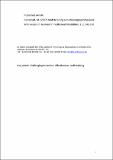Staff training and challenging behaviour : Who needs it?
Abstract
Staff working directly with people who have challenging behaviour in learning disability services need to be D good at what they do. These staff are trained by their employers to manage and to treat challenging behaviours and to improve the quality of life of people in their care. While such training is generally well evaluated by care staff, there is limited evidence that training alone changes poor attitudes or improves staff performance. Training has not been linked to quality of outcomes for service users. From research on treating challenging behaviour, achieving maintenance of behavioural gains after treatment has been discontinued is the exception rather than the rule. Can the same be said for maintaining gains achieved through staff training in the area of challenging behaviour? This discussion article reviews the value of training for staff working with people with challenging behaviour.
Citation
Campbell , M 2007 , ' Staff training and challenging behaviour : Who needs it? ' , Journal of Intellectual Disabilities , vol. 11 , no. 2 , pp. 143-156 . https://doi.org/10.1177/1744629507076928
Publication
Journal of Intellectual Disabilities
Status
Peer reviewed
ISSN
1744-6295Type
Journal article
Collections
Items in the St Andrews Research Repository are protected by copyright, with all rights reserved, unless otherwise indicated.

